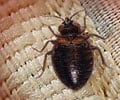Staph infections that become resistant to multiple antibiotics don't happen because the bacteria themselves adapt to the drugs.

Plasmids are rings of bare DNA containing a handful of genes that are essentially freeloaders, borrowing most of what they need to live from their bacterial host. The plasmids copy themselves and go along for the ride when the bacteria divide to copy themselves.
A team from Duke and the University of Sydney in Australia has solved the structure of a key protein that drives DNA copying in the plasmids that make staphylococcus bacteria antibiotic-resistant. Knowing how this protein works may now help researchers devise new ways to stop the plasmids from spreading antibiotic resistance in staph by preventing the plasmids from copying themselves.
"If plasmids can't replicate, they go away," said lead author Maria Schumacher, an associate professor of biochemistry in the Duke University School of Medicine. "This is a fantastic new target for antibiotics."
The work appears the week of June 9 in the Proceedings of the National Academy of Sciences.
An essential part of biology, plasmids are so minimalistic they're not even considered alive by themselves. But they're good at ferrying genes from one kind of bacteria to another in a process called horizontal gene transfer. They also excel at adapting to environmental conditions more quickly than their bacterial hosts. Plasmids are able to develop new defenses to an antibiotic and then share that new trick with other bacteria.
Source-Eurekalert
 MEDINDIA
MEDINDIA




 Email
Email







